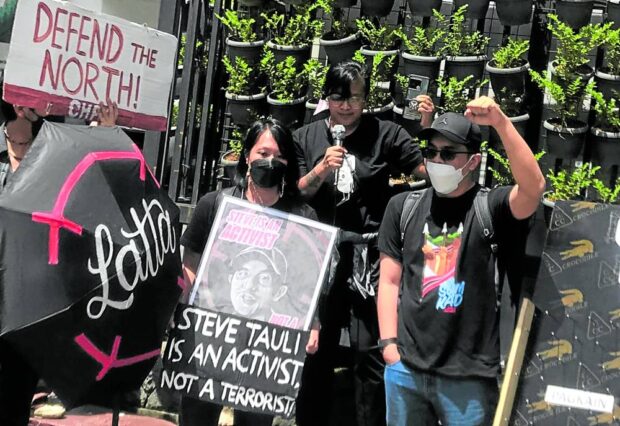
LET THEM BE Members of youth groups protest the government’s terror designation of Baguio-based activists Steve Tauli, Sarah Alikes, Jennifer Awingan and Cordillera Peoples Alliance chair Windel Bolinget in these placards during a rally staged on July 24. —VINCENT CABREZA
BAGUIO CITY — The city council here on Monday formally asked the Anti-Terrorism Council (ATC) to delist four local activists from the government’s roster of terrorists and urged the National Bureau of Investigation to evaluate state evidence linking them to the armed communist rebellion.
In a still unnumbered resolution that was passed unanimously, the council said the terrorist designations of Windel Bolinget, chair of the Baguio-based Cordillera Peoples Alliance (CPA) and three of its members—Sarah Abellon Alikes, Jennifer Awingan and Stephen Tauli, brother of former United Nations Special Rapporteur on Indigenous Concerns Victoria Tauli Corpus—should be dropped.
READ: ATC’s terrorist tag on Cordillera activists condemned
The four activists learned about their terror tags on July 10 from a Manila newspaper’s publication of ATC Resolution No. 41 (dated June 7). The ATC labeled them as officials of the New People’s Army (NPA), who supposedly operate clandestinely in Baguio to recruit new members or manufacture antigovernment propaganda.
“The designation of terrorists plays a critical role in the fight against terrorism but if it is based only on alleged verified and validated information, sworn statements and other pieces of information gathered by different Philippine law enforcement agencies which are biased and doubtful, the ATC will be misled [into taking part in] violating the rights of legitimate human rights workers and defenders,” the resolution asserted.
READ: PH terror council tags 6 Reds, 5 others as terrorists
It added: “It has been observed that it is the common strategy of state forces to file baseless complaints against human rights defenders, which ultimately get dismissed for lack of probable cause—purposely to pursue a strategy of harassment against human rights defenders.”
The council’s resolution was passed 12 days after four separate “motions to resolve the verified request for delisting” of Alikes, Awingan, Bolinget and Tauli were filed before the ATC on Sept. 20 by their lawyers, Antonio La Viña and Baguio Councilor Jose Molintas.
Heeding the grievance mechanism prescribed by Republic Act No. 11479 (the Anti-Terrorism Act of 2020, which created the ATC), La Viña and Molintas earlier transmitted letters penned by the activists to the ATC on July 21 asking for their withdrawal of their terrorist designations.
READ: CPP denounces ATC’s terrorist tag of NDFP’s Luis Jalandoni, 5 others
Validation
Lawsuits against activists “should be based on personal knowledge so that the affiants can be held accountable and chargeable of the crime of perjury if they make untruthful and baseless allegations,” the council said.
The legislative body also asked the NBI “to further verify and validate the information from the Philippine National Police” regarding activists that the government has associated with the NPA.
It cited a similar position made by Michael Frost, UN Special Rapporteur on the situation of human rights defenders and by Catalina Devandas Aguilar, chair of the UN Committee on Special Procedures and other international organizations, who described ATC Res. 41 as “an unacceptable attack and an act of retaliation by the present administration.”
Frozen assets
Meanwhile, Baguio lawyers Francisca Macliing Claver and her son, Ayangwa Francis Claver, have asked the Court of Appeals to direct the Anti-Money Laundering Council and the ATC to divulge all information used to freeze the assets of the activists and CPA.
They noted that the ATC has yet to address these appeals even after 60 days, even if the council was supposed to resolve administrative matters within 30 days.
According to the activists, ATC’s “inaction violates their rights to due process,” as well as their “right to be presumed innocent unless proven guilty after trial and conviction,” given the “secret ex parte” nature of its proceedings that led to the terrorist designations. INQ